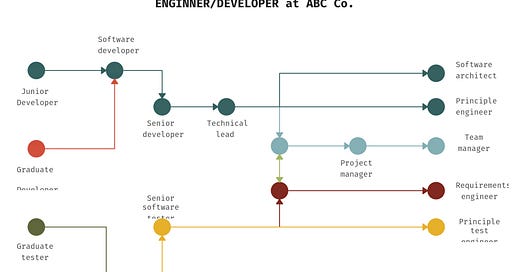Software Engineer Career Path
The software engineering career path is a dynamic journey that can take many forms depending on your interests, skills, and the industries you choose to work in. Below is an in-depth look at various aspects of this career path, from foundational education to advanced roles and alternative routes.
1. Foundational Education and Skill Building
Formal Education
Degrees and Certifications: Many software engineers begin with a bachelor’s degree in computer science, software engineering, or a related field. Such programs typically cover algorithms, data structures, operating systems, and software design principles.
Advanced Studies: Some engineers pursue master’s degrees or specialized certifications (e.g., in cybersecurity, cloud computing, or data science) to deepen their expertise or pivot into specialized fields.
Alternative Learning Paths
Coding Bootcamps & Online Courses: Intensive coding bootcamps and platforms like Coursera, Udacity, or edX offer hands-on training in modern programming languages and development frameworks.
Self-Learning: Many successful engineers are self-taught, leveraging online resources, open source projects, and communities to build their skills.
2. Entry-Level Roles
Junior Software Engineer / Developer
Responsibilities: Writing and debugging code, participating in code reviews, and learning the company’s codebase under the guidance of senior team members.
Mentorship: Entry-level roles often come with structured mentorship programs or pair programming practices to help new engineers acclimate to real-world coding practices and collaborative work environments.
Portfolio Building: Early projects and contributions—whether at school, through internships, or open source—are key to building a professional portfolio that demonstrates practical skills.
3. Mid-Level Positions
Software Engineer II / Mid-Level Developer
Increased Autonomy: With a few years of experience, engineers are expected to take on more complex projects, design solutions, and sometimes mentor junior team members.
Technical Specialization: At this stage, many engineers begin to specialize in a particular technology stack, domain, or aspect of software development (such as front-end, back-end, mobile development, or DevOps).
Cross-Functional Collaboration: Mid-level engineers often work closely with product managers, UX designers, and other stakeholders, requiring strong communication and collaboration skills.
4. Senior Roles and Leadership Positions
Senior Software Engineer
Architectural Decisions: Senior engineers take on responsibilities for high-level system design, ensuring that the software architecture is scalable, efficient, and secure.
Mentorship and Code Reviews: They often lead code reviews, guide technical discussions, and help set coding standards for the team.
Problem Solving: Expect to tackle complex, often company-wide problems that require innovative solutions and deep technical expertise.
Technical Leadership and Management
Tech Lead / Engineering Manager: As engineers grow, some move into leadership roles where they manage teams, oversee project timelines, and coordinate cross-team initiatives. This transition may require developing skills in people management, project planning, and strategic thinking.
Software Architect: Others choose to remain on a technical track, focusing on the overall design and direction of complex systems, which involves staying current with emerging technologies and best practices.
5. Alternative Career Paths
Specializations
Data Engineering & Machine Learning: Engineers interested in data may pivot to roles focused on big data infrastructure or machine learning model deployment.
Cybersecurity: Some software engineers specialize in creating secure systems and protecting against vulnerabilities, becoming experts in cybersecurity.
DevOps & Site Reliability Engineering (SRE): A focus on the intersection of development and operations can lead to roles that ensure software is reliably deployed and maintained in production environments.
Related Roles
Product Management: With a deep understanding of technology, some engineers transition to product management to shape the strategic direction of software products.
Consulting and Entrepreneurship: Experienced engineers may choose to work as independent consultants or launch startups, leveraging their technical expertise in business ventures.
6. Continuous Learning and Professional Development
Keeping Skills Up-to-Date
Emerging Technologies: The tech landscape evolves rapidly. Continuous learning—whether through formal courses, certifications, or personal projects—is crucial to remain competitive.
Networking and Community Involvement: Attending conferences, meetups, and contributing to open source projects can broaden your understanding of industry trends and connect you with mentors and peers.
Soft Skills: Beyond technical prowess, strong communication, problem-solving, and leadership skills become increasingly important as you advance in your career.
Career Growth Strategies
Performance Reviews and Feedback: Regularly seeking and incorporating feedback can guide your growth and help identify areas for improvement.
Setting Career Goals: Whether you aim to be a technical expert or move into management, setting clear, attainable goals can help steer your career path effectively.
Conclusion
The software engineering career path is not a one-size-fits-all journey—it offers a range of routes from hands-on technical roles to leadership and specialized fields. Success in this career depends on a blend of strong technical skills, continuous learning, effective communication, and a willingness to adapt to new challenges. Whether you’re just starting out or looking to advance your career, understanding these stages and continually developing your skills will set you on a path to a fulfilling and dynamic career in software engineering.




